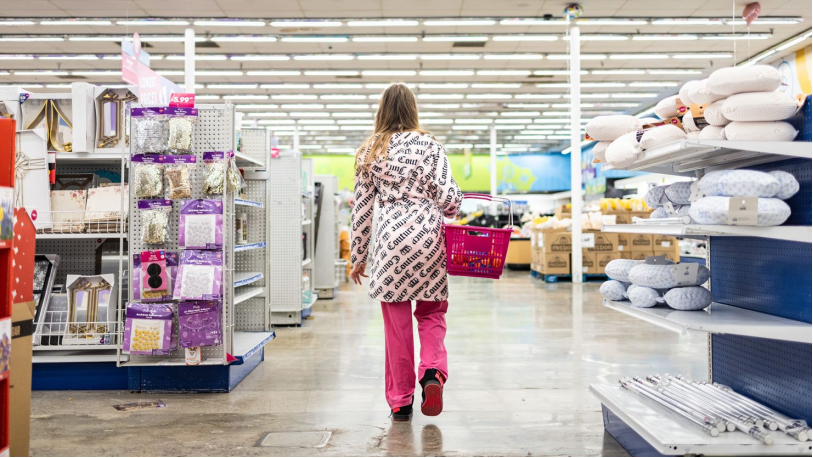
At present, American consumers may have reached the limit of consumption. Faced with rising inflation rates and decades high interest rates, they began to control spending, and their aversion to inflation also influenced their views on the economy and personal finance. Even if the Federal Reserve achieves a 2% inflation target, it is not enough to alleviate the majority of people's aversion.
Firstly, from the growth of expenditures in various industries, data shows that expenditures in April did not meet the 0.4% growth rate expected by economists. Excluding car sales, retail sales only increased by 0.2% in April. By industry, gas stations experienced the largest increase in expenditure, with sales in April increasing by 3.1% compared to the previous month. This may be the result of the surge in gasoline prices in the first two months, but it has started to cool down in recent weeks. The expenses of clothing and accessories stores, food and beverage stores, as well as restaurants and bars have also increased. However, apart from these industries, almost all other industries have experienced monthly declines in spending, with online retail sales experiencing the largest decline of 1.2%.
Secondly, recent research has sorted out inflation and revealed a huge gap between consumer demand and the Federal Reserve's goals. On average, Americans hope for an annual inflation rate of 0.20%, which is far below the central bank's target of 2% and far from the current inflation level, which was 3.4% last month. Research has found that demographic and socio-economic characteristics are the strongest predictors of people's preferred inflation rates. For example, elderly people and those whose income mainly comes from wages prefer lower inflation, while those with more assets on average prefer higher inflation.
In addition, Americans face higher costs in almost all aspects, from gasoline to home insurance to rent. After three years of high inflation, the cumulative effect is that consumers have paid 20% or even higher fees on many essential goods. The Congressional Budget Office pointed out that in the past four years, there has been a significant change in the types of items purchased since the outbreak of the pandemic, with people hoarding furniture and other large expenses leading to the purchase of durable goods. By 2023, this trend has significantly shifted towards services such as dining out, travel, and personal care. Although grocery prices slowed down in April, the price of renewing car insurance increased by 22.6%, bringing the overall increase since the beginning of 2020 to 47%. The cost for smokers increased by 6.7%, but the cost for drinkers only increased by 2%.
At the same time, this is also reflected in the use of credit cards. With the significant increase in credit card interest rates, the usage of credit cards has skyrocketed to record levels. However, "super high-quality" card users, who have a credit score of 780 or above, often have a higher monthly repayment rate than users with lower credit scores and income. Charlie Wise, Senior Vice President of Research and Consulting at TransUnion, stated that although the total outstanding credit card balance currently exceeds $1 trillion, prompting many economists to alert consumers of excessive nervousness, the year-on-year growth rate has slowed down.
Overall, with the rise of inflation, the US economy is undergoing drastic changes, prices are constantly rising, and the purchasing power of millions of Americans continues to decline. Despite the commitment of the US government to act quickly and take effective measures, the reality is full of uncertainty. From grocery stores to energy bills, the continuous rise in cost of living has made it difficult for American households to sustain themselves, and has also raised doubts among the public about the government's ability to effectively address this urgent issue. For most people, the increasing prices of essential items such as food and shelter make the economic environment more difficult and the wealth gap further widen.

报告显示,中国电力投资加速增长,预计2024年电网基建投资将超过5300亿元。
近日,市场迎来了一则引人注目的消息:工业巨头3M公司(MMM.N)在本周五公布了其季度业绩报告,随后股价飙升至近两年来的
最近,外媒给OpenAI算了笔账,今年可能要血亏50亿美元。
近日,巴黎奥运会和世界铁人三项协会联合发布了一项重大决定,宣布因塞纳河水质污染问题,原定于近期进行的奥运会铁人三项首次下
当地时间7月18日,法国巴黎发生了一起令人震惊的持刀袭警事件。
近期,一则重大消息在国际舞台上引起轩然大波,马来西亚宣布加入金砖国家。
调查发现,互联网和智能手机的使用干扰了韩国近五分之一学生的生活。